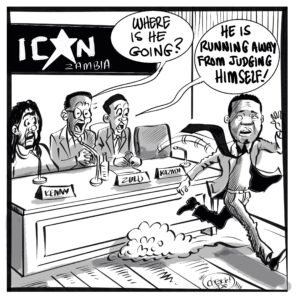LUSAKA (Reuters) – Zambia plans to drop treason charges against the country’s main opposition leader and free him from prison on Monday under a deal brokered by the Commonwealth secretary-general, government and legal sources told Reuters.
The United Party for National Development (UPND) leader Hakainde Hichilema and five others were arrested in April and charged with treason after Hichilema’s convoy failed to make way for President Edgar Lungu’s motorcade.
Hichilema’s trial had been due to begin on Monday but two sources said the prosecution would apply to the court to discontinue the case.
The case has stoked political tensions in the continent’s No. 2 copper producer, seen as one of Africa’s more stable and functional democracies, following a bruising election last year.
Commonwealth Secretary-General Patricia Scotland visited Zambia last week and told reporters she had met Lungu and Hichilema separately and that the two leaders had agreed to a process of dialogue facilitated by her office.
“That process of dialogue, which the Commonwealth Secretary-General Baroness Patricia Scotland is leading with the help of Catholic bishops, starts with the release of the opposition leader from prison,” a government source told Reuters on Sunday, referring to local religious leaders.
“The state will discontinue the treason case in the public interest as both the opposition leader and the head of state are committed to burying their past and starting dialogue envisaged to help address some of the issues the opposition raised after the 2016 elections so that the 2021 elections are better held.”
Lungu is committed to all aspects of the dialogue agreed between the president and the opposition leader, the source said, which include promoting peace, stability and public good.
“An overt act serious enough to warrant prosecution exists but the public interest seems to be the overriding consideration, so a nolle prosequi will be entered,” a public prosecutor told Reuters, using the legal term for the discharge of a case.
The southern African country has always been relatively stable but relations between the government and the opposition have been fraught since August when Lungu’s Patriotic Front (PF) beat the UPND in a presidential election marred by violence and which the opposition says was rigged.
It was the second time that Lungu beat Hichilema, an economist and businessman popularly known by his initials “HH”, in a presidential election by a razor-thin margin.
In June, church leaders including those from the influential Catholic church, called for Hichilema’s release.
Last month Lungu invoked emergency powers to deal with “acts of sabotage” by his political opponents, after fire gutted the country’s biggest market.
Under emergency laws, police can prohibit public meetings, detain suspects longer than usual, search without a warrant, close roads, impose curfews and restrict certain people’s movements.























